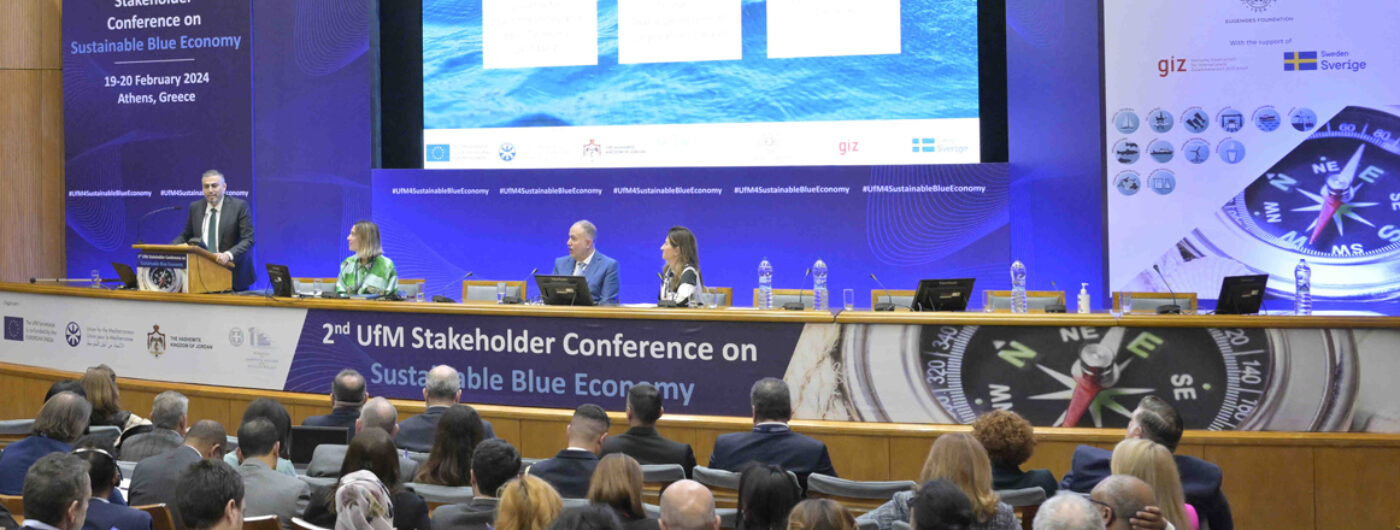The 2nd UfM Stakeholder Conference on Sustainable Blue Economy took place on February 19 and 20 in the Greek capital, with over 350 participants evaluating the progress made within the framework of the 10 Sustainable Blue Economy priority areas adopted in 2021 and discussing next steps.
The event, which featured 11 workshops on topics ranging from marine research and innovation to sustainable tourism or the blue finance process, was hosted by the Union for the Mediterranean, its EU and Jordanian Co-Presidency, and the Ministry of Maritime Affairs and Island Policy of Greece.
February 19-20, Athens. Over 350 people got together for the 2nd UfM Stakeholder Conference on Sustainable Blue Economy taking place in Athens. Public and private officials, as well as key civil society actors, discussed the progress made to date and next steps for the implementation of the 10 priority cooperation areas endorsed by the 43 UfM Member States in the 2021 UfM Ministerial Declaration on Sustainable Blue Economy. The conference served as a forum for the exchange of knowledge and best practices while also charting the course for further political deliberations.
“The progress made is not solely thanks to the institutional work but also thanks to the commitment and cooperative mindset of our stakeholders, ensuring a sustainable development of the blue economy in the Mediterranean,” European Commissioner for the Environment, Oceans and Fisheries Virginijus Sinkevičius commented. “It is crucial to hear their vision, to listen to their ideas, to learn from their expertise, and exchange views. The Union for the Mediterranean is making this cross-sectorial and cross-border collaboration a reality.”
“The Mediterranean Sea is a vital resource for more than 480 million people living along its shores as sea-based economic activities across our shared basin generate an estimated annual economic value of at least US $450 billion,” UfM Secretary General Nasser Kamel said. “The sectors and activities of the Mediterranean sustainable blue economy are of utmost importance for the rational and sustainable use of our sea-based resources, for economic growth in our region, and for supporting improved livelihoods and job creation.”
“The UfM work on blue economy is centred on responding to our region’s challenges, including the loss of biodiversity, environmental degradation, and the climate crisis, as well a lack of employment; we cannot advance on the previous aspects without cooperation and partnerships,” said the UfM Deputy SG Almotaz Abadi.
“The 2nd UfM Stakeholder Conference on Sustainable Blue Economy is a unique opportunity for the southern and northern countries of the Mediterranean to exchange experiences and learn about sustainable blue economy success stories,” said Mohammad Al Sakran from the UfM’s Jordan Co-Presidency and the Director of the Aqaba Development Corporation.
The conference featured 11 parallel multi-stakeholder workshops designed to facilitate capacity building and engagement:
- Marine research and innovation for a sustainable blue economy in the Mediterranean
- Blue skills, career pathways, and employment for a sustainable blue economy
- Sustainable food from the sea: fisheries and aquaculture
- Sustainable, climate-neutral and zero-pollution maritime transport and ports
- Tackling marine litter for a sustainable blue economy
- Sustainable blue economy initiatives under the territorial context of islands
- Sustainable maritime and coastal tourism
- Ecosystem-based integrated coastal zone management and maritime spatial planning as cross-sectors enablers
- Marine renewable energies
- Maritime safety and security of blue economy activities
- The blue finance process in the Mediterranean
The discussions held within each of these provided the basis for the revision of the roadmap for the implementation of the Ministerial Declaration on Sustainable Blue Economy. There were also networking activities, including B2B sessions to provide acceleration services to innovative SMEs fostering internationalisation and to upgrade skills towards a more uniform maritime cluster ecosystem in the Mediterranean basin. The event came to a close with a session on upcoming projects, calls and financial opportunities.
Background
In February 2021, the UfM’s 43 Member States adopted the Ministerial Declaration on Sustainable Blue Economy in which they defined 10 priority cooperation areas:
- Governance and the future of sea basin strategies in the Mediterranean region
- Marine research and innovation, skills, careers and employment
- Sustainable food from the sea: fisheries and aquaculture
- Sustainable, climate-neutral and zero-pollution maritime transport and ports
- Interactions between marine litter and the blue economy
- Coastal and maritime tourism
- Maritime spatial planning and integrated coastal zone management
- Marine renewable energies
- Maritime safety and security of blue economy activities
- Sustainable investments in the blue economy
This commitment to circularity and climate neutrality in the Mediterranean came just over three years after the 1st UfM Stakeholder Conference on Sustainable Blue Economy in Naples and was followed by the approval of a roadmap for its implementation in 2022. The UfM is also a member of the Blue Mediterranean Partnership, an initiative that aims to mobilise at least €1 billion in sustainable blue economy investments in the Southern and Eastern Mediterranean.
More information
2nd UfM Stakeholder Conference on Sustainable Blue Economy Page


